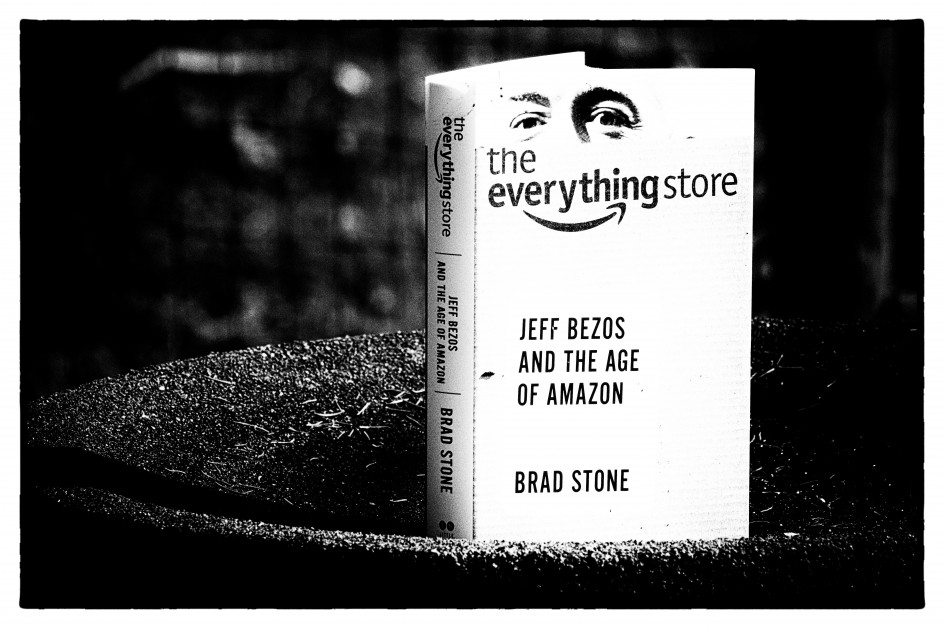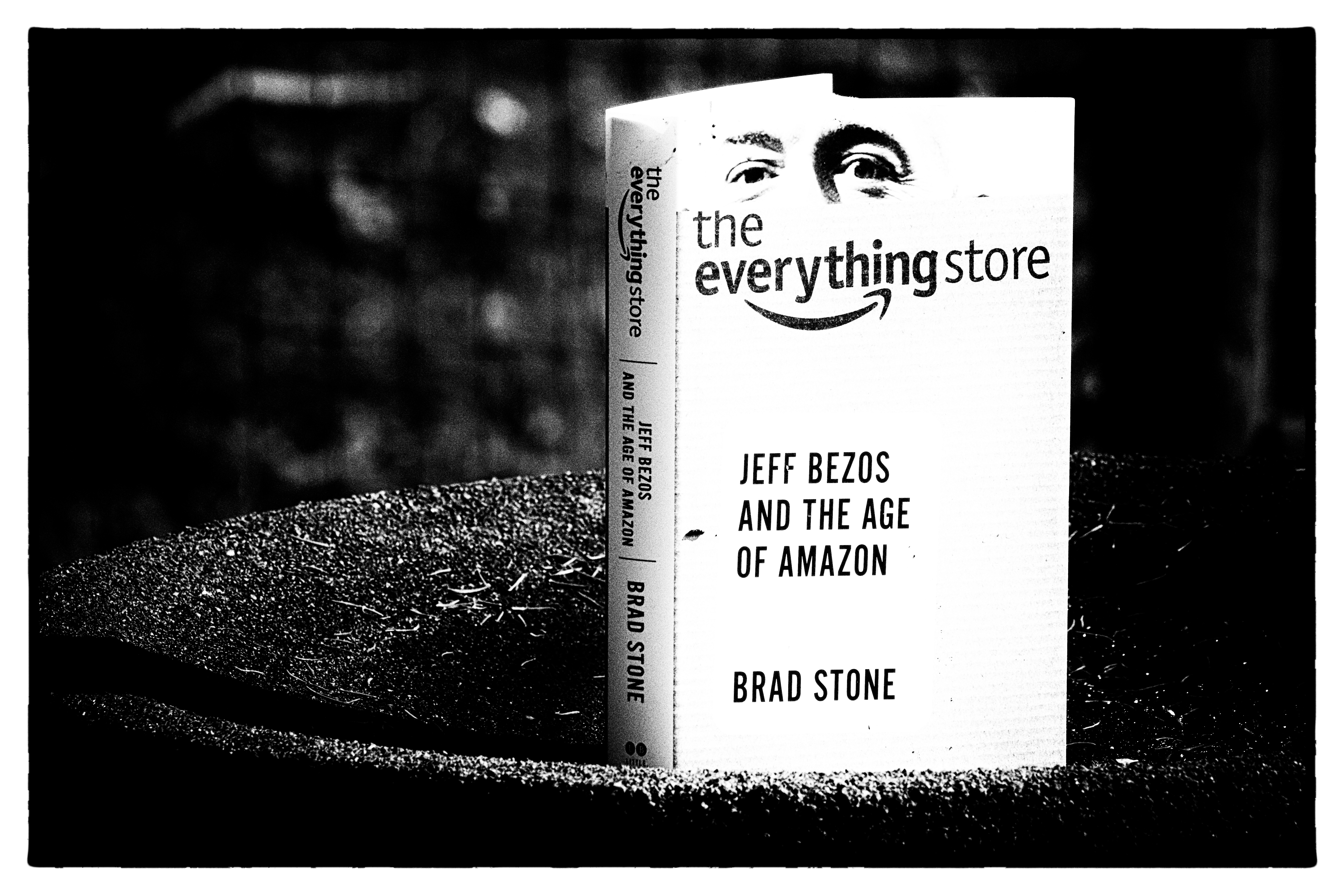
Note: Please consider buying this book from Battenkill Books, my local bookstore and a great independent store or your local bookstore. You can visit their website or you can e-mail them ([email protected]) or you can call them at 518 677-7136. Buying local is our best hope for individuality and the preservation of creativity.
In The Everything Store: Jeff Bezos And The Age Of Amazon, an important and surprisingly readable, even riveting book (Little Brown, $28), author Brad Stone quotes Jeff Bezos, the founder of Amazon, as saying Amazon did not change the world of publishing, the future changed the world of publishing.
As I read this book – one of those books that will help you understand the world you live in, not the one you used to live in – I kept thinking of how similar Jeff Bezos and Steve Jobs are in the ways they worked and their astonishing impact on the world. Both men are in the great American tradition of Henry Ford and Thomas Edison, two anti-corporate free thinkers who saw the new world and never wavered in their pursuit of it. Jobs and Bezos are personally different, Jobs was much hipper and more culturally in tune than Bezos, but both slugged their way through incredible setbacks, defied every conventional corporate wisdom, were ruthless and cruel to their colleagues and subordinates and changed the lives of much of the world.
If Jobs redefined culture, Bezos has redefined business as well as publishing. Both men were ferocious advocates for their consumers, they worshipped the notion of customer service. Bezos, like Jobs, does not come through this book as a nice or generous or forgiving man. He ridiculed employees he thought were slow or obtuse, turned suddenly on colleagues and friends, he charged workers for parking their cars in the Amazon lot and rejected the lavish perks that were common in the tech world in places like Apple, Google and Facebook.
Bezos is best known for setting the elitist and arthritic publishing world on it’s ear, he understood that writers and publishers and bookstores did not worry much about readers – who they were, how much money they had, what they wanted. Bezos worried only about readers, and as a result, he brought cheaper books to vast new audiences and pioneered the digital reading device, thus reinventing the very idea of the book. He opened his site to negative reviews, bludgeoned retailers into submitting to his drive for lower prices.
Brad Stone’s book appears balanced and carefully researched, this is no loving tribute, it is unsparing in it’s portrayal of Bezos and his cruel and obsessive nature, along with many colossal mistakes, most of which would have sunk the biggest companies, but which Bezos was always able to battle his way through. Bezos, like Jobs, was ultimately indestructible, he never weakened or wavered. It is mesmerizing to track the way Amazon has grown from an online book store to a store that has a global network of vast distribution centers and is now selling almost everything that can be sold, from custom made knives to videos to fresh food delivered overnight in major urban areas. Besides retailing, Amazon has also become a powerhouse technology company, selling web and computing services to software developers and corporations and computing space to individuals.
Bezos will do anything, Stone reports, to give Amazon’s customers fast and inexpensive service at the lowest prices imaginable, Amazon’s computer bots scour the earth to check prices and make certain Amazon’s are lower and to get products to people quickly. His vast distribution centers – he calls them “fulfillment centers”- are technological marvels on a scale of the Great Pyramids. They are also, as Stone points out, brutal places to work staffed mostly by low-paid and temporary workers with rough quotas of packages per hour to fill. Bezos is not one of those generous employers who likes to give back to his employees.
Staff meetings at Amazon are terrifying experiences at Amazon, Bezos often blows his top in vein-popping outbursts – called “nutters” – ridiculing ideas he doesn’t like as dense or stupid. People who lie to him or disagree or drag their heels vanish quickly. Bezos may care about consumers, but not much about the humans working in his many facilities. Jobs and Bezos were both bullies, and in the corporate world, bullies often win.
Both Jobs and Bezos were determined to use technology to make life as easy as possible for beleaguered people trying to master new technologies. Neither ever stopped fighting for the person on the other end of the system – the buyer. One company after another dreamed of creating digital reading devices, they were all clunky and expensive failures – until Bezos obsessed on the making the Kindle simple and inexpensive. Publishing was never the same after that.
In one chapter, Stone describes the brief battle between editorial writers and software programs competing to see which was more effective at getting people to buy books. The software program won, and that is, in so many ways, the story of Amazon.
Bezos is now a multi-billionnaire, Amazon is now one of the wealthiest and most powerful companies in the world. You also get the sense reading this well-balanced and surprisingly gripping book that Amazon is just getting rolling, and that companies like this are just too big – for their sake, for our sake. Amazon’s competitors litter the corporate landscape – undermined, driven out of business, bought or otherwise devoured. You cannot help but admire Bezos for what he has done, you cannot help fearing him for what he has done and might do. In the history of the earth, there have never been companies as ruthless and powerful and just plain big – as Amazon is getting to be. Not even Wal-Mart can stand up to Bezos or figure out how to keep up with him.
I wonder if anyone anywhere really considers the impact on our economy and lifestyle of a commercial entity that sells every single thing cheaper than anyone else can sell it and puts pressure on the very idea of the real-world business with real buildings and people. What kind of world will that be? This is not something Bezos or anybody else seems to think much about.
Stone did a wonderful job with this book, which could have just been another tech or business tome. He never loses track of Bezos, he is the narrative around which the book is drawn. Stone even discovers that Bezos was adopted and he tracks down his biological father, an elderly bicycle repair shop owner in Arizona who has never heard of Bezos. Bezos’s response to learning who his father is a vivid human touch in the book – I won’t give that away here.
I highly recommend The Everything Store: Jeff Bezos And The Age of Amazon to anyone who wants or needs to know how the world we live in really works. It is sometimes disturbing, sometimes inspiring, relentlessly fascinating. The modern corporation is nearly paralyzed by risk-averse lawyers, stockholders and board members, none of whom dare to take expensive risks. That seems to be the province of obsessed outsiders and loners like Jobs and Bezos, they are so fundamentally and uniquely American, both great and awful men at the very same time. Amazon touches just about every person alive in this country, it was fascinating for me to learn how it really works and was put together.
–
To order this book from Battenkill Books, go to their website or call 518 677-2515.

